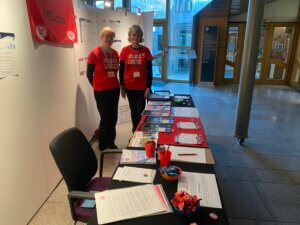Australia’s National Health and Medical Research Council (NHMRC) appointed a group of medical professionals and people representing people with Myalgic Encephalomyelitis and chronic fatigue syndrome to an ME and CFS advisory committee. The committee, who have begun meeting, will advise the government on current research, gaps in research and whether the 2002 clinical guidelines for doctors should be revised.
The NHMRC did not put out a call for applications for positions on the advisory committee, unlike the USA’s Department of Health and Human services does for it’s Chronic Fatigue Syndrome Advisory Committee. Nor did it follow the UK example and hold workshops with stakeholders before recruiting a guideline committee.
The Australian ME and CFS advisory committee comprises seven medical professionals/researchers and two consumer representatives:
- Professor Kwun Fong (Chair) specialises in lung disease at the University of Queensland’s Faculty of Medicine and is a thoracic and sleep physician at The Prince Charles Hospital.
- Dr Gary Deed specialises in diabetes. Dr Deed’s profile states his ‘particular areas of focus include Women’s Health, Chronic Fatigue. Fibromyalgia, Diabetes and Austistc Spectrum Disorder’.
- Professor Rachel Ankeny is a Professor of Ethics. Prof Ankeny’s stated areas of expertise are history/philosophy of science, bioethics and science policy, and food studies.
- Associate Professor Suzanne Broadbent is a clinical exercise physiologist at the University of the Sunshine Coast. The University’s website lists her top area of expertise as ‘Chronic Fatigue Syndrome/ME exercise management, intermittent and graded exercise’. Associate Prof Broadbent recently did a five week aquaerobics trial on patients with chronic fatigue syndrome (no set criteria) and found all participants improved. Prof Broadbent was applying for funding to run a bigger project.
- Professor Andrew Lloyd is an infectious diseases physician, and an epidemiology, virology and immunology researcher. Prof Lloyd developed the UNSW Fatigue Clinic which treats chronic fatigue syndrome with graded exercise therapy (GET) and cognitive behavioural therapy (CBT). Prof Lloyd published studies on chronic fatigue syndrome (including the ‘Dubbo studies‘) and is one of the authors of the widely-criticised 2002 Australian CFS Guidelines. More recently, he undertook a study to roll out CBT and GET training to medical professionals to treat chronic fatigue syndrome.
- Professor Sonya Marshall-Gradisnik is an immunology researcher, specialising in ME and CFS. Prof Marshall-Gradisnik is well-known as Director, National Centre for Neuroimmunology and Emerging Diseases, Griffith University. NCNED is endorsed by a number of Australian patient organisations and charities. Prof Marshall-Gradisnik and the team have patented a diagnostic biomarker and assessed potential treatments. Prof Marshall Gradisnik is an author of the International Consensus Criteria for ME.
- Dr Kathy Rowe is a paediatrician at the Royal Children’s Hospital in Melbourne with more than 45 years experience, specialising in chronic fatigue syndrome and myalgic encephalomyelitis. Dr Rowe was one of the authors of the 2002 Australian CFS guidelines and the 2017 Primer on Myalgic Encephalomyelitis/Chronic Fatigue Syndrome Diagnosis and Management in Young People.
NHMRC consumer representatives are responsible for providing a comprehensive and informed understanding of the perspectives and dynamics of patients. The two consumer members on this committee:
- Simone Eyssens is a volunteer member of Emerge Australia and ME Action. Sally Missing is the president of Emerge Australia and is Ms Eyssens’ support person/proxy.
- Penelope McMillan is president of South Australia’s state ME/CFS society.
The advisory committee held one meeting last year and one meeting so far this year. The NHMRC published a short summary of each meeting afterwards on their website.
Systematic reviews and current literature was discussed at the first meeting, which continued at the second meeting, as well as a discussion on a biobank and the UK’s treatment guidelines.
Making the most of the committee
Australian research is underfunded and the government’s clinical guidelines are outdated so the ME and CFS advisory committee is welcomed. It provides an important opportunity to call on the government to fund biomedical research and to give Australian doctors desperately needed clinical guidance.
The advice from this committee will determine if diagnostic and treatment guidelines are updated and where Government research funding should be directed. For people with ME/CFS the outcomes from this committee will influence the medical treatment they receive, how easy it is to access to the NDIS and what income support payments people can receive.
This is a valuable opportunity, if the ME and CFS advisory committee avoids the trap of endorsing outdated, disproven theories. If the right decisions are made, it will direct funding to developing a diagnostic test, theraputic treatments and a cure.
To make the most of this opportunity and to receive support from patients, health officials and researchers, the committee needs to:
- Commit to an open and transparent process
- Outline how it will include the view of leading Australian scientists and clinicians who are not members of the committee
- Explain how international processes to change/review guidelines will be used to inform advice to the NHMRC Chief Executive
- Advise how it intends to evaluate highly questioned science (i.e. graded exercise therapy, cognitive behavioural therapy and studies that failed to use criteria)
- Commit to requiring future publicly funded research using defined criteria/guidelines
How this can happen
Open and transparent process
To deliver an open and transparent process the advisory committee should consider:
- Publishing an annotated agenda and agenda papers two weeks ahead of meetings
- Publishing the minutes and action items of meetings within a week of the meeting being held.
Currently no notice is given of upcoming meetings and scant information is provided afterward. There is no current option to subscribe to receive information.
Incorporating views of leading Australian scientists and clinicians
It would be disappointing if the expertise of the following Australian scientists, who are considered to be making important progress in researching ME, was not included in this process:
- Professor Paul Fisher, Head of Discipline of Microbiology, Latrobe University
- Dr Sarah Knight Senior Paediatric Neuropsychologist at Murdoch Children’s Research Institute
- Dr Brett Lidbury Associate Professor at Pattern Recognition and Pathology at ANU
- Mr Christopher Armstrong, Bio 21, Molecular Science and Biotechnology, University of Melbourne
- Dr Henry Butt, Microbiologist and Director of Bioscreen
- Dr Paul Gooley, Department of Biotechnology and Molecular Biology, University of Melbourne
- Dr Don Lewis, Director of CFS Discovery Clinic
- Dr John Whiting, clinician – physician, expertise in ME
- Dr Richard Kwaitek, clinician – rheumatologist and medical researcher
- Dr Neil McGregor, Medicine Dentistry and Health Sciences, University of Melbourne and former editor of the Journal of Chronic Fatigue Syndrome
International work on revising guidelines
To deliver on its terms of reference, the committee’s starting point should be understanding the science and rationale behind the changes to the US and Norwegian guidelines. It should also understand the process and science being used to review the UK guidelines. To this end, the advisory committee should approach the NHMRC to contact government officials in these countries to obtain the relevant information.
Assessing the place of Graded Exercise Treatment and Cognitive Behaviour Therapy and studies that failed to use criteria
As there are members of the panel who are proponents of GET and CBT, at a time when this science is known to be harmful and considered outdated, it is important that the panel sets out how it will consider this science. In doing so, it will be important to advise how it will avoid or treat studies that have been forced to revise their results (i.e. PACE). This should include setting out how the advisory committee will consider systematic reviews that are based on erroneous results, such as the Cochrane review.
There are also members of the panel who have conducted studies that relied on self-identification, GP diagnosis, or very broad criteria. It is important the panel sets out how it will consider studies without identified criteria in forming their advice to the NHMRC. A 2016 Australian study reported that almost 2 in 5 were incorrectly diagnosed with CFS and ME, and more than two-thirds did not meet the International Consensus Criteria for ME.
The advisory committee should consider whether to adopt the approach used by the United States Agency for Healthcare Research and Quality (AHRQ). In the systematic review of diagnosis and treaatment of ME/CFS conducted by the AHRQ they disregarded studies that used the Oxford criteria, as this was found to be too broad and included people who had alternative fatiguing illness or who had illness that resolved spontaneously over time.
Future research
In proposing future research it is important that for reasons of comparability and accuracy that it be a requirement to use specified criteria/guidelines. A paper by Frank Twisk outlines how different criteria identifies different patient cohorts. The Jason et al paper in response to the IOM new SEID diagnostic criteria suggested there may be four groupings of patients:
- People with fatigue> 6 months which cannot be explained by medical or psychiatric condition
- People whose fatigue can be explained by a medical or psychiatric condition
- A more specific category posited by the IOM, Canadian Clinical Case criteria, ME-ICC, and a more empiric approach
- A smaller even more impaired group proposed by Ramsay
In commissioning any future research, it is important to include the more severely impaired group who are too ill to leave their houses or care facilities.
Australia has world-leading scientists and their work must be funded so we can keep them working in the field, helping not only Australian patients but millions around the world.
To provide feedback or views to the NHMRC, email [email protected]
First published in MEAustralia.net





